Texas Offshore Injury Attorney
The Texas offshore injury attorney team at Trey Barton Law represents injured offshore workers and their families in complex maritime incidents and offshore injury claims. We have a proven track record of maximizing verdicts and settlements against some of the largest maritime and oil and gas companies in the country. No matter what resources defendants may have, our Texas offshore injury lawyer group fights for those injured working offshore, taking on some of the largest companies in the industry and ensuring clients are fully compensated for all their injuries and losses.
Our Texas offshore accident lawyers handle maritime injury cases on a contingency fee basis, so victims don’t pay any fees unless we win. If you need maritime lawyers to protect your interests for injuries that happen in the Gulf of Mexico/America, call 832-916-2526 or contact us online for a free and confidential consultation.
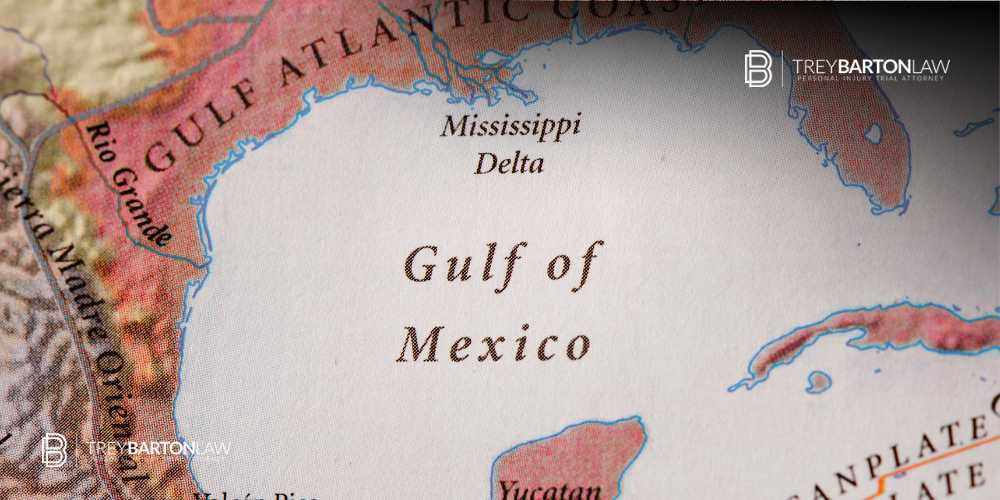
Our Texas Offshore Accident Lawyer Team Holds The Largest Companies in the Oil and Gas Industry Responsible
Our offshore accident lawyer group has a proven track record of success in some of the most serious offshore accidents and the most significant maritime injury cases in the industry, holding powerful companies accountable and securing justice and fair settlements for injured offshore workers and their families. Our Texas offshore injury attorney group has won over $40 million on behalf of clients in the past five years. We’ve successfully handled negotiations and court trials against some of the largest maritime industry players, recovering some of the largest settlements and verdicts in those locations.
Our maritime lawyers understand the ways that the largest companies in these industries try to avoid responsibility. We fight to secure maximum compensation when representing injured offshore workers, maritime workers, and other crew members injured or killed working offshore.
Our offshore accident attorney group works to deliver justice no matter what and has the verdicts and settlements against some of the largest companies in the maritime industry to prove it.
We’ve handled some of the most complex offshore injury cases, trials against some of the largest maritime companies in the industry, and have a proven track record of ensuring workers and their families don’t accept settlements unless they’re fully compensated for immediate and future costs.
Contact our Texas maritime lawyers for a free case review to learn how our commitment to representing clients and securing record-setting verdicts can help you recover the resources you need to move forward.
Offshore Employer Negligence: Oil and Gas Companies and Offshore Drilling Contractors
When offshore injury cases result from unseaworthiness, not conducting regular maintenance on equipment, lack of training, or violations of U.S. Coast Guard or OSHA regulations, offshore oil and gas companies are subject to liability for failing to ensure worker safety. Additionally, when drilling contractors ignore weather hazards in the Gulf of Mexico/America, cut corners in high-risk environments, or violate maritime safety regulations on platforms, MODUs, or FPSOs, our maritime lawyers can help hold them accountable.
Third-Party Responsibility: Maritime Companies, Transport Operators, and Offshore Contractors
Third parties, such as transport or maritime companies, may face liability in offshore injury cases for negligence, mechanical failures, or other maritime safety violations. Examples include maritime companies operating support vessels, transportation providers, maintenance and construction contractors, and manufacturers. When outside companies fail to follow safety rules, supply faulty machinery, or cause dangerous conditions, they can be held responsible for the injured offshore workers’ recovery.
Service Provider and Maintenance Crews
Service and maintenance crews may be liable in offshore injury cases for ignoring safety protocols, missed inspections, failing to properly secure equipment during repairs, or other dangerous procedures.
Defective Equipment Liability: Manufacturers and Repair Companies
Equipment manufacturers and repair companies may be liable for failing to warn about known risks, ignoring safety standards during production or servicing, providing inherently dangerous parts, or substandard repairs that injure workers directly or indirectly.
Labor Management Companies: Inadequate Training, Negligent Hiring, and Supervision Accountability
Labor management companies may be liable for inadequate training, negligent staff placement in crucial roles, or allowing a lack of safety culture to go unchecked, leading to dangerous conditions.
Vessel, Drilling Platform, MODU, and Floating Production System Owners
Platform, MODU, FPS, and vessel owners may be liable when poor maintenance, unsafe conditions, or regulatory violations lead to maritime incidents.
What To Do After a Maritime Injury in Texas
Insurers are paid to ensure offshore companies pay less for maritime injuries than the offshore injury cases would be worth if they went to trial. The majority of offshore companies are known for avoiding responsibility when those working offshore suffer severe injuries.
After serious offshore accidents or maritime accidents occur, injured offshore workers can expect their employers or their insurers to:
- Demand that the injured worker provide recorded statements immediately after the maritime accident occurs, before an experienced offshore injury attorney can explain their legal protections.
- Lose or destroy evidence that proves negligence by maritime companies, operators, or contractors caused the maritime accident.
- Hire private investigators to follow injured maritime workers and their families, online and in person, to discredit offshore injury cases.
- Direct injured workers to employer-preferred doctors and pay selected “experts” as a way to shift fault away from maritime and offshore companies.
- Blaming injured workers for not performing JHAs or JSAs, even when employers are negligent in safety culture or hire staff without training for critical roles.
- Limiting injured offshore workers to basic benefits under the LHWCA, which rarely covers non-economic damages, future care, or lost income.
- Discouraging injured offshore workers from hiring maritime lawyers, knowing this makes it harder for them to avoid responsibility.
Many of the largest companies in the oil and maritime industry will act quickly to terminate employment, typically as soon as the statute of limitations expires on their offshore injury case. Employers may also require injured maritime workers to sign waivers before releasing paychecks or reimbursements, which only helps employers avoid responsibility.
Do not assume employers will do the right thing, and do not sign anything without first contacting a skilled Texas offshore injury lawyer from our law firm.
Call 832-916-2526 for a free case review to protect your rights and discuss your offshore injury case.
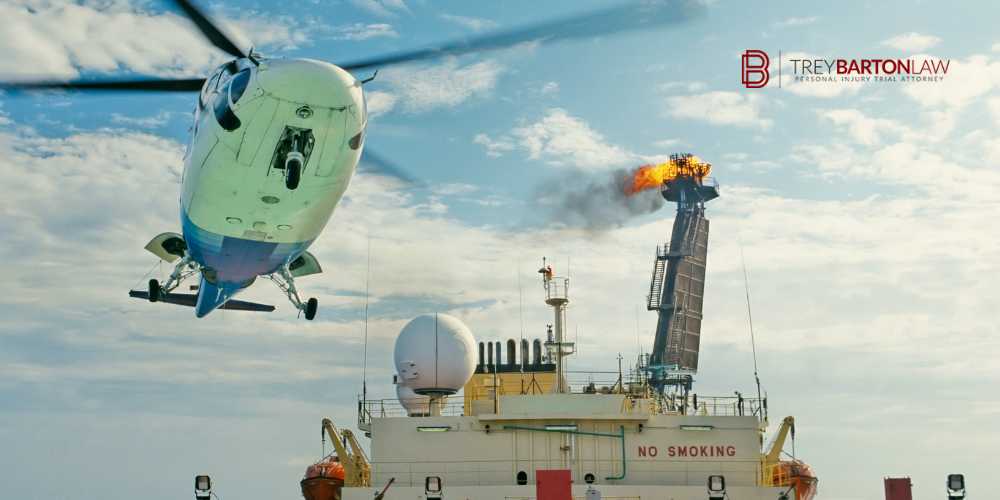
Legal Protections Our Texas Offshore Accident Attorney Team Can Pursue
Longshore and Harbor Workers' Compensation Act - LWCA Claims for Injured Maritime Workers (Not Seamen)
The LHWCA covers certain maritime workers who are injured offshore or near navigable waters but do not qualify as “seamen” under the Jones Act.
Examples of maritime workers in the oil and gas industry typically covered include:
- Fixed platform crews (production, mechanics, electricians)
- Offshore construction and maintenance contractors
- Welders, pipefitters, crane operators, and riggers on fixed installations
- Divers and subsea technicians not assigned to vessels
- Marine construction and support personnel using non-vessel platforms
- Shore-based workers supporting offshore transport or logistics
The LHWCA provides coverage for injuries occurring on docks, piers, wharves, shipyards, terminals, and fixed offshore platforms on the Outer Continental Shelf. This covers medical expenses, disability compensation, and vocational rehabilitation, but does not allow injured offshore workers to sue their employers for negligence.
However, many employers and insurers will dispute claims or delay settlements, so injured maritime workers should speak with a skilled maritime lawyer at our law firm to protect their legal rights and ensure they’re fully compensated.
Jones Act Claims For Injured Seamen Working on Mobile Oil Rigs or Platforms
The Jones Act, or Merchant Marine Act, is a federal law that protects maritime workers classified as seamen, those who spend at least 30% of their time working offshore in navigation. So, the Jones Act allows injured seamen to sue maritime employers and be fully compensated for medical bills, lost wages, pain and suffering, and future income.
Examples of injured seamen can include: offshore rig crews, like roustabouts, roughnecks, drillers, motormen, crane operators, deckhands, vessel-assigned electricians, cooks, and divers working from support vessels.
Examples of maritime employers in the oil and gas industry include:
- Offshore drilling contractors, MODU operators (Transocean, Valaris, Noble Corporation, Seadrill, Shelf Drilling, Diamond Offshore, Borr Drilling, Stena Drilling), floating production system companies
- Drillship, FPSO, jack-up rig, and semi-submersible operators
- Maritime companies providing supply or crew transportation, and vessel-based worker placement
- Marine construction, diving, and service contractors using support vessels or barges
- Companies providing offshore crane operations, well servicing, wireline, heavy lift, or subsea maritime work
A Texas Jones Act lawyer from our law firm can evaluate the duties to determine if victims can file a Jones Act claim for injured workers or their loved ones. To understand how the Jones Act applies to offshore injury cases or for skilled legal representation for injuries occurring during offshore work, contact a Texas offshore injury attorney for a free case review.
General Maritime Law
General Maritime Law governs maritime activities and offshore injury cases not covered by the Jones Act or LHWCA. It provides legal protections for maritime workers who don’t qualify as seamen.
General maritime law applies when a maritime worker is injured due to unseaworthy conditions, negligence, or inadequate medical attention. Typically, general maritime law covers maritime workers injured in navigable waters, including offshore units, transport ships, and support boats. This can include:
- Workers on navigable waters not covered by the Jones Act or LHWCA.
- Contractors or support staff injured while performing loading, unloading, maintenance, or temporary work aboard offshore units.
General maritime law fills critical gaps where LHWCA and Jones Act doesn’t apply, and it often works in tandem with those statutes depending on a worker’s duties and the circumstances of the offshore injury case.
General maritime law provides daily living expenses and medical care until recovery, as well as pain and suffering in negligence or offshore injury cases involving unseaworthiness. Additionally, in offshore injury cases where maritime employers intentionally refuse or delay medical care or living expenses to injured offshore workers and their families, our Texas offshore injury attorney team can pursue punitive damages.
To determine your legal options under general maritime law, contact our experienced offshore injury attorneys for a free consultation.
Death On High Seas Act (DOHSA)
DOHSA applies when a death occurs more than three nautical miles from shore (including international waters) due to negligence or wrongful acts, allowing certain family members to seek compensation. In the offshore oil and gas industry, DOHSA commonly applies to fatalities on drillships, semi-submersibles, jack-up rigs, barges, and support vessels.
This act only covers lost wages, loss of household support, and funeral expenses. It does not allow recovery for pain and suffering or other non-economic damages. DOHSA claims typically result from crew member, contractor, or passenger fatalities working on vessel-based offshore oil or maritime operations.
Outer Continental Shelf Lands Act (OCSLA)
OCSLA applies federal law to offshore workers on fixed platforms engaged in oil and gas operations. This includes platforms used for drilling, production, or related support work.
We also have extensive knowledge of:
- U.S. Coast Guard MODU Regulations: These govern the design, operation, and safety standards for MODUs operating in U.S. waters. These regulations cover structure, fire protection, emergency equipment, navigation, drilling systems, and crew qualifications. When offshore operators aren’t in compliance, they can be held accountable for preventable offshore accidents.
- International Maritime Organization (IMO) MODU Code: This code sets safety and construction regulations for MODUs engaged in offshore oil and gas operations. It ensures proper stability, structural design, fire protection, emergency systems, and machinery safety. When offshore operators or owners aren’t in compliance, they can face liability after preventable offshore drilling accidents.
How a Texas Maritime Lawyer From Our Law Firm Can Help
Maximum Compensation For Oil and Gas Workers Injured Working Offshore
Our Texas offshore injury attorney group helps injured offshore workers secure maximum verdicts and settlements. We use a deep knowledge of the legal processes related to maritime and offshore injury cases to investigate what caused the maritime accident, identify at-fault parties, gather crucial evidence, secure expert testimony, and ensure the offshore injury case is filed correctly.
Our offshore injury lawyers in Texas pursue full compensation, including lost wages, medical expenses, future care, pain and suffering, and other financial losses. By negotiating directly with insurers or taking the case to trial, our Texas maritime lawyers fight to ensure injured workers and their families only take settlements in offshore injury claims when they are fully compensated for all their injuries, both now and in the future.
How a Texas Offshore Death Lawyer Helps in Wrongful Death Claims
Our Texas offshore death lawyer group helps families receive financial compensation and justice after a loved one is tragically killed working offshore. We investigate the cause of death, preserve crucial evidence, and determine at-fault parties.
Our maritime lawyers then file wrongful death claims to secure compensation for lost wages, funeral costs, loss of household support, and other financial losses suffered by surviving family members.
Our offshore death lawyers also protect families from employer interference, prevent evidence destruction, and fight to ensure some of the largest companies in the oil and maritime industries can’t avoid accountability. By fighting throughout the process, our Texas offshore injury attorney group holds all responsible parties accountable and fights to ensure families receive the maximum verdicts and settlements they deserve for the wrongful death of their loved one.
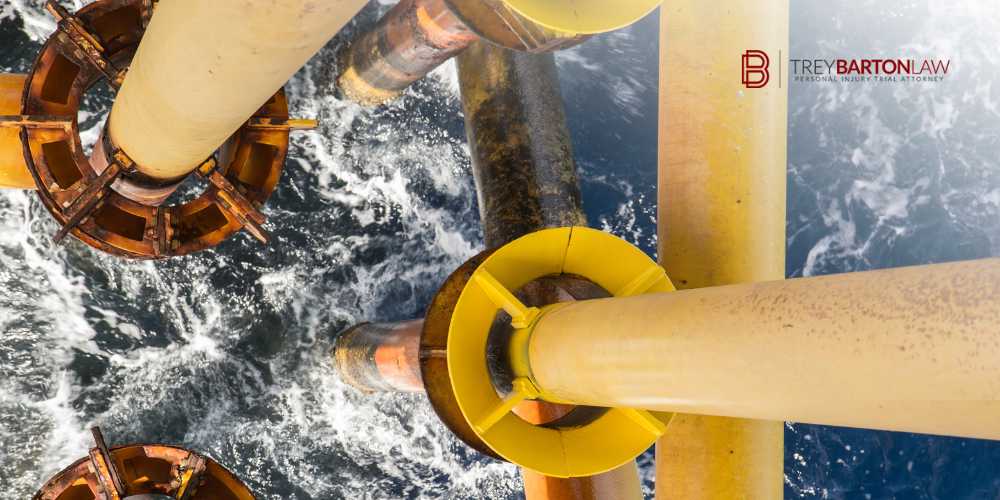
Common Offshore Injury Cases Our Texas Offshore Accident Law Firm Handles
Offshore Oil Rig Explosion / Fire
A Texas offshore oil rig explosion lawyer helps injured offshore workers seek compensation after serious offshore accidents involving explosions or fires. Offshore oil rig explosions often cause severe harm to offshore workers, maritime workers, and other workers. Our Texas offshore injury lawyer group secures compensation from the largest companies in the oil and maritime industries and guides injured workers and their families through these complexities.
Blowout (Well Control / BOP Failure)
Offshore blowouts often happen when flammable materials escape under extreme pressure, leading to serious offshore accidents. Faulty equipment, human error, or safety violations by oil and gas companies and offshore contractors often cause blowout incidents. A skilled Texas offshore fire lawyer ensures injured workers and their families are fully compensated for all their injuries and related costs.
Blowdown and Gas Release (Conflagration)
Blowdown and gas release incidents involving conflagration can cause fires, toxic exposure, and severe offshore injuries. A Texas offshore injury attorney can seek full verdicts and settlements on behalf of injured offshore workers when offshore incidents result from unmaintained equipment, pressure control issues, or negligence in ensuring workers’ safety.
Offshore Drilling Platform, Semi-Submersible, and Jack-Up Rig Accident
Offshore drilling platforms, semi-submersibles, and jack-up rigs often expose oil and gas employees to blowouts, fires, and dropped loads. Our Texas mobile offshore drilling unit lawyer group helps injured offshore workers recover damages for medical bills, lost wages, and future costs caused by unsafe conditions on these rigs.
Liftboat Accident
Liftboat accidents often involve structural collapse, sudden capsizing, or equipment failure during elevated operations; our Texas offshore injury attorney team fights to ensure offshore workers injured in preventable accidents are fully compensated.
Marine Vessel Collisions
Collisions during offshore work often leave injured offshore workers with uncertain futures. Collisions with other vessels create hazards that threaten the lives, welfare, and long-term well-being of offshore workers injured on the job. Under offshore law, injured workers may be entitled to full recovery, and our Texas maritime lawyers have a history of maximizing settlements and verdicts in high-risk maritime work cases.
Mooring Failure and Ballast System Failure
Mooring and ballast system failures can destabilize rigs or vessels, leading to sudden shifts, flooding, or capsizing; our Texas maritime lawyers can file lawsuits on behalf of injured workers harmed by preventable events.
Offshore Crane Failure
Offshore crane failures often result in dropped loads or heavy equipment movements, leaving injured offshore workers with severe trauma or even death. These accidents result from several factors like mechanical defects, fatigue, or miscommunication during long shifts, and our Texas offshore injury lawyer group has the ability and commitment to secure maximum recovery for offshore workers hurt on the job.
Manlift, Personnel Transfer, and Basket Transfer Accident
Manlift, personnel transfer, and basket transfer accidents are major threats during oil rig-to-boat transfers, especially in rough seas. When employees are caught or dropped due to operator error, the injured worker can suffer serious injuries or even death. Our Texas offshore injury attorney group understands the pivotal role these systems play in daily trips and fights for fair recovery on behalf of injured offshore workers.
Offshore Worker Falls and Offshore Workers Struck By Dropped Objects
Slips-and-falls and struck-by accidents are among the most common causes of offshore injury cases. They often result from long hours on slick surfaces, unsecured equipment, or falling objects. Our Texas offshore accident lawyers represent injured workers and hold offshore companies accountable for unsafe conditions.
Equipment Malfunction and Failure (Top Drive, Rotary Table, Winch, and Pipe Handling System)
Equipment malfunctions and failures expose employees to some of the most dangerous offshore work, especially when drilling. When heavy machinery fails due to negligent maintenance or negligence in ensuring worker safety leads to life-altering injuries, our Texas offshore injury attorney team represents those injured working offshore to secure full compensation.
Offshore Confined Space Incident, Chemical Exposure, and Crush Injuries
Offshore confined space incidents, chemical exposure, and crush injuries often result in life-altering injuries. When powerful companies in the maritime industry don’t follow safety or hazard controls in high-risk environments, our maritime lawyers help injured workers recover compensation from offshore employers through chemical exposure or oil and gas crush injury claims in Texas.
Electrocution and Electric Shock
The most common causes of electrocution on offshore oil rigs are faulty wiring, exposed circuits, or improper grounding near heavy machinery. Our Texas offshore accident lawyers represent those hurt in these incidents, ensuring injured offshore workers are fully compensated by maritime companies that ignore electrical safety standards.
Offshore Helicopter Accident and Other Transportation Accidents
Offshore helicopter crashes and transportation accidents often occur during crew transfers to offshore oil rigs or platforms, especially in rough weather. Mechanical failures, overloading, and inadequate safety procedures can lead to severe injuries, such as spine or head injuries, or death. Our offshore accident attorney group represents offshore workers injured during transit and holds liable parties responsible for ignoring critical safety regulations.
Swing Rope and Gangway Accident
Swing rope and gangway accidents happen when supervisors rush transfers, don’t position boats correctly, or force associates to use worn or unsecured equipment. Our Texas offshore accident lawyers build strong offshore injury cases against operators who contribute to the injured offshore workers’ status.
Dive Bell Accident and Underwater Welding Accident
Common causes of dive bell and underwater welding accidents are supervisor negligence and equipment malfunctions. Offshore oil and gas companies that ignore pressure hazards, power supply issues, or emergency protocols put divers at critical risk. Our offshore accident attorneys hold employers responsible, ensuring injured offshore workers and the family members of those tragically killed are fully compensated for all their injuries or deaths.
Gulf of Mexico Weather and Hazardous Conditions: Failure to Stop Offshore Operations
When operators continue offshore operations during rough seas, hurricanes, or other adverse weather conditions in the Gulf of Mexico/America, our Texas offshore injury lawyers can seek maximum verdicts and settlements on behalf of those tragically killed or injured offshore due to poor weather planning.
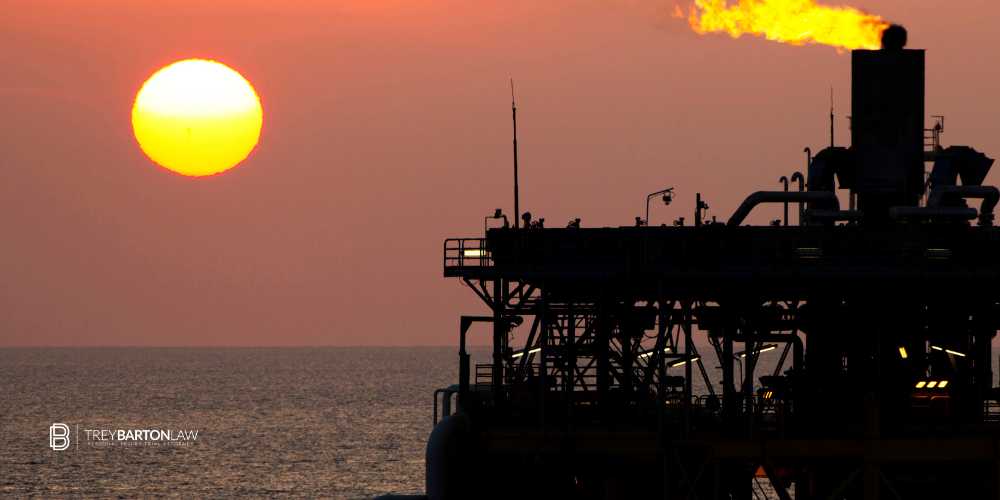
Statute of Limitations For Offshore Injury Claims in Texas
The statute of limitations depends on where your offshore injury claim falls:
- Texas personal injury/wrongful death: two years
- Death on High Seas and Jones Act: three years
- Longshore and Harbor Workers’ Compensation Act (LHWCA) and Outer Continental Shelf Lands Act (OCSLA): one year to file, two years to report personal injuries
- Maintenance and Cure (maritime remedy): three years (varies by court)
Texas Offshore Injury Lawyer
Offshore workers injured in serious offshore accidents across the Gulf of Mexico and beyond deserve a law firm with a commitment to speaking truth to power, experience, and resources to hold offshore companies liable. Our Texas maritime lawyers have spent decades representing clients who are injured offshore due to explosions, slips and falls, equipment failure, and other factors involved in offshore injury cases. Based in Houston and focused extensively on injuries happening off the coast and oilfield accident claims in Texas, our offshore accident lawyer group helps injured seamen, injured maritime workers, and other injured offshore workers and their families recover the largest settlement or trial verdict possible, because we know how vital our clients’ jobs, health, and future are.
Our offshore accident lawyers handle all maritime accident cases on a contingency fee basis, so victims don’t pay legal fees unless we win fair settlements or trial verdicts. Speak with our associates today for a free and confidential consultation to discuss your legal rights, recovery, and potential court standing.
Call 832-916-2526 for a free consultation.
Practice Areas
Serving These Cities & Counties in Texas
Free Consultation
Our experienced Houston personal injury attorneys want to get to know you and understand your unique situation. We offer a free, no-obligation consultation. You don’t pay unless your case is won.
Awards & Recognition
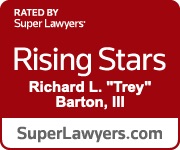





No Fee Unless You Win
Trey Barton understands the hardships injured people and their loved ones face as they try to heal from their accident. Every case is prepared as if it is going to trial. This gives you the best opportunity to obtain a fair recovery for your case, and ensures I am positioned to take the case to trial if the insurance company does not give you the money you deserve.
